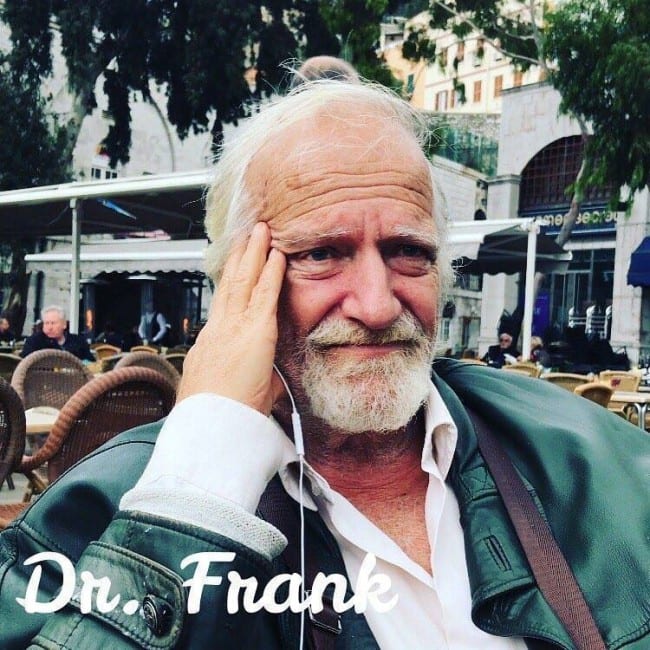

HE has survived malaria, angina, alcoholism and clinical ‘death’ (twice) and has spent 60 years in a wheelchair.
You could forgive psychologist Frank Stahl – commonly known as Dr Frank – for feeling life has dealt him a tough hand. But not a bit of it. People and their problems are his mission.
“What motivates me is all the people who call me, 40 or 50 years after I see them, and say, ‘Thank you so much’,” this silver-haired 71-year-old knight of the realm tells me as the mid-morning Casemates Square crowds bustle past.
“So many people say, ‘Do you recognise me? You helped me’. You don’t need anything else.”
This altruism has underpinned Stahl’s career as a life coach. Indeed, the generosity with which he has dispensed his expertise to patients unable to pay him saw him knighted by Spain’s Royal Family in 2004.
More recently, Dr Frank has become a social media phenomenon. Teaming up with Gibraltar marketing expert Chris Gomez, Stahl’s Facebook page is attracting thousand of visitors a week. His themed Facebook videos are filmed in Casemates, and the verbose doctor is compulsive viewing. Fag in hand, he delivers his monologues in a warm, Scandinavian burr and the effortlessness that 45 years as a psychiatrist has given him.
“I understand what it is the patient needs within five or six minutes,” says Stahl.
“I am ADHD, and have many ADHD patients. I enjoy working with people when they have bad confidence, when they are scared.”
Gomez has now set up Stahl’s YouTube channel as anxiety-ridden Gibraltarians and Spaniards turn to him for guidance in these troubled times.
A Fuengirola resident operating out of Gibraltar’s Valmar Clinic, the doc’s psychology skills have also seen him called as an expert witness at court cases in Sweden, Denmark and Spain.
His style is refreshingly direct and irreverent. Self-effacing and funny, the German-born Swede has an instinctive feel for the patient’s needs.
“A lot of patients come in and think they are worthless,” says Gomez, who films Stahl’s Facebook videos.
“Frank is able to hone in on what they are good at. And the hardships he has endured have allowed him to develop the psychology and address the whole spectrum of problems people have.”


The ‘hardships’ – Stahl dismisses the word – have been many. From the age of 12, arthritis forced him into a wheelchair. As a young actor, he overcame the alcoholism he used as a crutch to combat stage fright. Aged around 40, he was physically dead for 90 seconds, experiencing an out-of-body sensation that he describes as ‘the most lovely feeling in my life’. A bout of malaria contracted in Tunisia levelled him. As well as ADHD, he has had some 200 heart attacks as an angina sufferer.
Despite these setbacks, Stahl has an outlook on life that can be described as ‘devil-may-care’.
His knighthood is a case in point. Modest to the last, it is clear the mere mention of the honour embarasses him. In fact, Stahl almost didn’t even go to the Segovia ceremony.
“A couple of days before, I went into an Irish Town bar, put two or three pounds into a slot machine and won around £900,” he says.
“I thought ‘Ok, they probably want me to go’. I couldn’t even find the place in Segovia at first. When I got there they told me, ‘We’re waiting for you’.
“I was told there was somebody already knighted and he would show me the routine. But I had seen what they were having for dinner and I wanted to get to that.
“If somebody calls you Sir you are still you. You don’t become better or worse. If my mother wanted to call me Sir she would have called me that, instead of Frank,” he quips.
Rubbing shoulders with high society discomforts Stahl who is most at home helping his patients – or ‘friends’, as he calls them. He even developed his own self-hypnosis technique – the Dream Walk – to fight the panic attacks he experienced following a car crash in Sweden.
Life in a small community like Gibraltar presents its own particular set of challenges for residents.

“There are people who live in shabby little places and can’t get anything better,” he says.
“There is also a lot of anxiety because people talk too much about each other. People know too much about each other here.
“And there is a lot of ADHD here. Compared to Spain and Sweden it is higher, I don’t know why, but it is.”
His own physical trials and tribulations certainly haven’t held him back. An Aikido expert – ‘he can kick someone’s ass from that wheelchair’, says Gomez – he is a published writer and speaks seven languages.
In fact, Stahl believes he has achieved so much because of the difficulties he has experienced, not in spite of them.
“I think I am privileged, being ill all the time. It has made me so strong,” he says.
“Even if I have a really bad day, I am sitting at home writing books and having fun. Either you see yourself as poor little me, or you say,’What can I do with my life’?”
To find out more visit: www.facebook.com/AskDrFrank/








